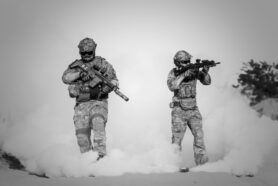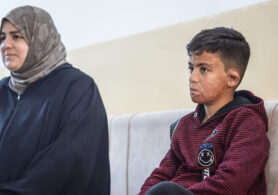Remote warfare involves combining (drones) strikes, while special operation forces and military training teams train local forces to do the fighting and dying on the battlefield. The latter strategy is often referred to as security force assistance (SFA). In the post 9-11 era, the US military has engaged in SFA across the Middle East and Africa.
On this episode of the Modern War Institute podcast, Professor dr. Will Reno and military Professor dr. Franky Matisek, discuss their findings on the realities of SFA. Both have researched the topic extensively, including conducting hundreds of interviews with advisors from the US and allied militaries as well as foreign military personal that have received military assistance from the US and NATO.
The reason why Prof. dr. Reno and dr. Matisek study this topic is because the US government has spent over 340 billion dollars on training, advising, and equipping foreign militaries since 2000 and they predict this practice is likely to dominate the 21st century battlefields.
Reno and Matisek both agree that the core reasoning behind SFA is to make local security forces act better and to have greater capacity. They also offer critical insights on why SFA often fails to meet these stated goals. They discuss at length the often problematic relationship between the host state and the receiving state:
“It is incredible to see the disconnect between what the US or other Western powers say about military assistance and then talking to a person on the receiving end, and just seeing that there is so much left to be studied and discussed about it” (dr. Franky Matisek).
Besides that, SFA does not work when the interests of both the host state and receiving state are not clear. According to Reno, the host state should know the receiving state very well and build networks. Another way for SFA to work is to have a general within the military of the host country that should be held accountable, which is now not the case according to Matisek.
Finally, it is acknowledged that many more advanced militaries are now engaging in this practice and Matisek’s argues that this calls for an update in agenda setting. He implies that Western advanced militaries will increasingly engage in SFA not to build liberal orders, but to advance realist interests.
Click here for the link to listen to the podcast.
The Modern War Institute podcasts features guests like senior military, defense leaders and scholars who discuss the most important issues related to modern conflict.
This post was written by IRW LAB student Cemre Açikgöz.



